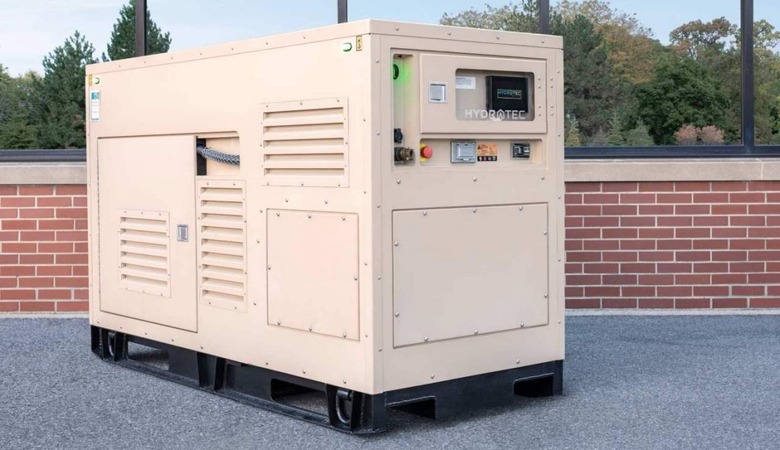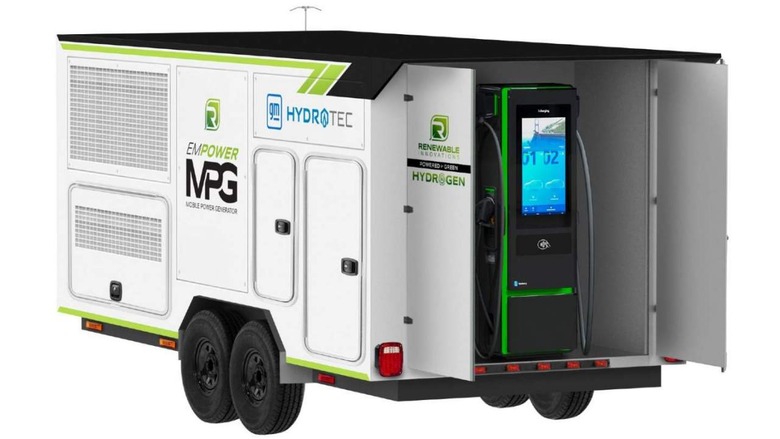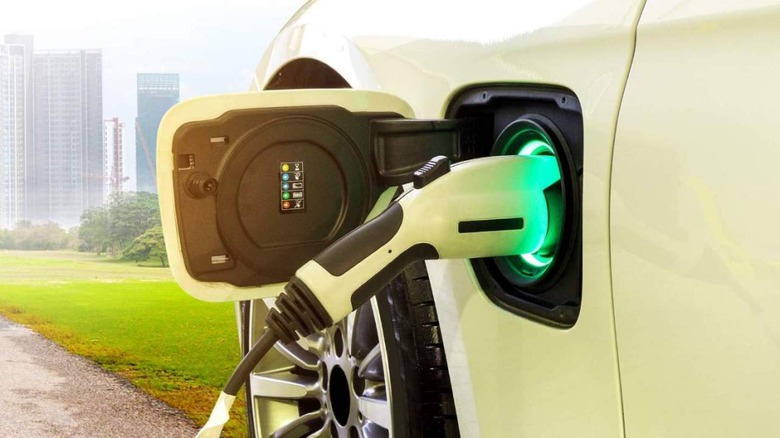GM's EV Charging Fix Uses Hydrogen Where The Grid Falls Short
General Motors has announced three new projects that'll leverage the company's hydrogen-based fuel cell technology for a variety of clean energy applications. Though this tech has largely revolved around zero-emissions vehicles, GM envisions additional uses for its Hydrotec-based power generators, ones that would replace traditional "dirty" gas and diesel generators at everything from construction sites to outdoor concerts.
The three projects in development include the EMPOWER rapid charger, Mobile Power Generator (MPG), and a palletized version of the Mobile Power Generator intended specifically for the military. All three are based on GM's Hydrotec, specifically the Generation 2 Hydrotec fuel cell power cubes.
Put simply, the MPG devices are intended to serve as non-permanent charging points for electric vehicles, enabling them to charge EVs wherever they're located. The EMPOWER rapid charger, meanwhile, is a bit different, as it is specifically intended to bring DC fast-charging capabilities to "retail fuel stations [...] without expanding the grid."

EMPOWER is the result of a collaboration between GM and Renewable Innovations, the company explains. The commercial version of this product is intended to provide EV fast charging at fuel stations and, potentially, other areas with high traffic levels like popular vacation spots.
GM says EMPOWER could be a more affordable way to increase access to EV fast charging because, unlike traditional charge points, it doesn't require significant and expensive upgrades to the local electrical infrastructure. That's due to the Hydrotec-based charger's eight power cubes and hydrogen tanks. The catch, of course, is that the internal tanks would eventually need to be refilled once the hydrogen runs out.
However, GM is estimating at this time that an EMPOWER rapid charger could offer fast charging to up to four electric vehicles at the same time with power levels starting at 150kW. The company expects it would take around 20 minutes to fully charge an EV using one of these rapid chargers.

GM describes EMPOWER as akin to a large power bank for cars. As with the small power banks consumers can carry around to charge their smartphones on the go, EMPOWER chargers could be deployed temporarily in places where demand is seasonal — for example, they could be rolled out at large festivals, then moved to a different destination once the event is over.
That hints at the company's wider hydrogen-based power generator ambitions, with GM explaining that its hydrogen fuel cells can be leveraged to provide clean energy for a variety of purposes beyond charging EVs. The company provides multiple examples of how its tech may be used, including as backup power sources for small businesses and residential areas hit by temporary power outages. Likewise, the tech could be used to help power worksites, outdoor concerts, and other destinations where traditional "dirty" fuel generators are often found.

As mentioned, one of the three Hydrotec projects is a palletized version of the MPG intended specifically for military use. The US Army is already evaluating this product, according to GM, as a potential way to power military camps and heavy-duty equipment. The product, which is still a prototype at this time, is said to be the equivalent of a 60kW generator, though with around 70-percent greater power production compared to an ordinary diesel generator.
In addition to the military evaluation of the palletized version, the California Energy Commission has funded a demonstration involving a few MPGs to demonstrate how they may prove useful for addressing wildfires and dealing with planned power shutoffs. Finally, a demonstration of a version of the MPG used as mobile EV charging stations is expected to take place this summer.
Looking forward, GM says Renewable Innovations will have 500 of the EMPOWER rapid chargers deployed in the US by the end of 2025, though it's unclear where they'll be found.
